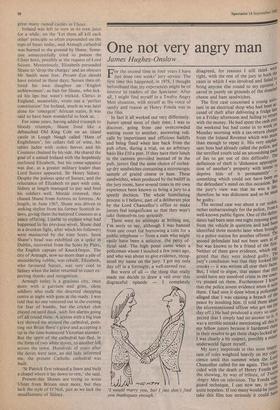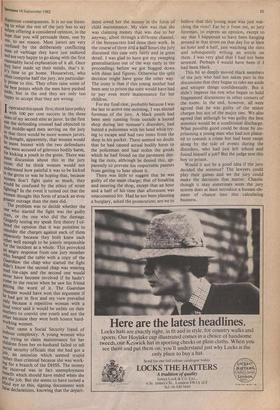One not very angry man
James Hughes-Onslow
or the second time in four years I have
" just done two weeks' jury service. The first time this happened, in 1978, I thought beforehand that my experiences might be of interest to readers of the Spectator. After all, I might find myself in a Twelve Angry Men situation, with myself as the voice of sanity and reason as Henry Fonda was in the film.
In fact it all worked out very differently. Jurors spend most of their time, I was to discover, going from one overcrowded waiting room to another, answering roll- calls by impertinent and officious bailiffs and being fined when late back from the pub often, during a trial, on an arbitrary basis like El 0 a pint. If they have their lunch in the canteen provided instead of in the pub, jurors find the same choice of curled- up dry sandwiches containing a microscopic sample of grated cheese or ham. These sandwiches, when produced by the bailiff in the jury room, have several times in my own experience been known to bring a jury to a speedy decision. The whole humiliating process is I believe, part of a deliberate plot by the Lord Chancellor's office to make jurors feel insignificant so that they won't take themselves too seriously.
There were no attempts at bribing me, I'm sorry to say, although I was banned from one court for borrowing a coin for a public telephone — from a man who might easily have been a solicitor, the petty of- ficial said. The high point came when a policeman whom I insulted a few years ago, and who was about to give evidence, recog- nised my name on the jury. I got my only day off in a fortnight, a well-earned rest.
But worst of all — the thing that really made me decide to draw a veil over this disgraceful episode — I completely
`I would marry you, but I just don't find you inadequate enough.' disagreed, for reasons I still think were right, with the rest of the jury in both the cases in which I was involved and failed to bring anyone else round to my opinion. caved in purely on grounds of the dreaded cheese and ham sandwiches. The first case concerned a young assis. tant in an electrical shop who had been ae" cused of theft after delivering a fridge late on a Friday afternoon and failing to returri with the money. He had spent the cash over the weekend but had come in to work 0° Monday morning with a tax-return cheque from the Inland Revenue which was more than enough to repay it. His very unPl sant boss had already called the police, ahi, the terrified youth told an astonishing Pack of lies to get out of this difficulty. The definition of theft is 'dishonest approPria" tion of another's property with intent to deprive him of it permanently' something which could not have been on the defendant's mind on this occasion. But the jury's view was that he was a liar; therefore he was dishonest and so he must be guilty. The second case was about a car stolen, rather embarrassingly for the police, from 3 well-known public figure. One of the defeh' dants had been seen one night running away from the vehicle in question and had been identified three months later when brought to a police station for another offence. The second defendant had not been seen at all but was known to be a friend of the fast' Neither of them gave evidence, which gig' gested that they were indeed guilty. The jury's conclusion was that they looked like crooks — it was written all over their faces' But, I tried to argue, that meant that they could have any unsolved crime in the coup" try pinned on them. Furthermore I ku°*: that the police invent evidence when it suits them. I had seen it done when a policertia° alleged that I was causing a breach of Of peace by insulting him. (I told them ab°,1)t, the aforementioned officer who got me t",; day off.) He had produced a story so unelt pected that I simply had no answer to it. was a terrible mistake mentioning all this to my fellow jurors because it hardened the in their resolve to get these chaps locked uP: I was clearly a bit suspect, possibly a mil° underworld figure myself. My sorry ineptitude in this most imP°I' tant of roles weighted heavily on my c0 rdcience until this summer when the Lo Chancellor called for me again. This coirld' cided with the death of Henry Fonda an the showing, by way of tribute, of Daly' Angry Men on television. The Fonda rear• guard technique, I can now see, is really quite hopeless. If too many would-be jurors take this film too seriously it could have disastrous consequences. It is no use listen- ing to what the rest of the jury has to say before offering a considered opinion, in the 110Pe that you will persuade them, one by One, to see reason. Most jurors are very confused by the deliberately conflicting mass of verbiage they have just endured and are very happy to go along with the first reasonably lucid explanation of it all. Once they have made up their minds, that's it. It's time to go home. Housewives, who often comprise half the jury, are particular- ly prone to this. They often raise some of the best points which the men have pushed aside, but in the end they are only too haPPy to accept that they are wrong.
operated this speak first, think later policy
with 100 per cent success in the three eases of my second stint as juror. In the first one the defending counsel had objected to four middle-aged men serving on the jury so that there would be more women jurors. He thought, apparently, that women would be more lenient with the two defendants who were accused of grievous bodily harm, for kicking a youth in the groin. There was some discussion about this in the jury room: did he think women would not understand how painful it was to be kicked In the groin or was he hoping that, because women don't fight quite so much, they would be confused by the ethics of street fighting? In the event it turned out that the women thought this form of attack an even greater outrage than the men did.
The problem was to decide whether the one who started the fight was the guilty man, or the one who did the damage.
r., Mgerly testing my speak first theory I of- fered the opinion that it was pointless to consider the charges against each of them separately because they both knew each other well enough to be jointly responsible for the incident as a whole. This provoked an angry response from one jury member who banged the table with a copy of the 0uardian: the chap who started the fight didn't know the second chap was wearing steel toe-caps and the second one would never have become involved if he hadn't c°111e to the rescue when he saw his friend getting the worst of it. The Guardian thumper would have won this argument if he had got in first and my view prevailed only because a repetitive woman with a loud voice said it would be unfair on their mothers to convict one youth and not the other because they were both honest hard- working women. Next came a Social Security fraud of tedious complexity. A young woman who was trYing to claim maintenance for her children from her ex-husband failed to tell Social security officials that she had got a Job, an omission which seemed stupid rather than criminal because she was work- Irikg for a branch of the DHSS. The money sine received was in fact unemployment benefit which should have ended when she got the job. But she seems to have turned a blind eye to this, signing documents with raise declarations, knowing that the depart-
ment owed her the money in the form of child maintenance. My view was that she was claiming money that was due to her anyway, albeit through a different channel, if the bureaucrats had done their work. In the course of three and a half hours the jury discussed this case very fairly and in great detail. I was glad to have got my sweeping generalisations out of the way early in the proceedings before we got bogged down with dates and figures. Otherwise the split decision might have gone the other way. The irony is that if this young mother had been sent to prison the state would have had to pay even more maintenance for her children.
For my final case, probably because I was the last to arrive one morning, I was elected foreman of the jury. A black youth had been seen running from outside a looted shop during last summer's disorders, had butted a policeman with his head while try- ing to escape and had two items from the shop in his pocket. There seemed no doubt that he had caused actual bodily harm to the policeman and had stolen the goods which he had found on the pavement dur- ing the riots, although he denied this, ap- parently to prevent his respectable parents from getting to hear about it. There was little to suggest that he was guilty of the main charge; that of breaking and entering the shop, except that an hour and a half of his time that afternoon was unaccounted for. Had he not been planning a burglary, asked the prosecution; are we to believe that this young man was just wat- ching the riots? Far be it from me, as jury foreman, to express an opinion, except to say that I happened to have been hanging around in that street on that day for at least an hour and a half, just watching the riots and subsequently writing an article on them. I was very glad that I had not been arrested. Perhaps I would have been if I had been black.
This bit so deeply moved black members of the jury who had not taken part in the discussions that they began to take me aside and whisper things confidentially. But it didn't impress the rest who began to hold fragmented discussions in other corners of the room. In the end, however, all were agreed that he was guilty of the minor charges but not of the major one. We also agreed that although he was guilty the best sentence would be a conditional discharge. What possible good could be done by im- prisoning a young man who had not plann- ed to commit a crime but had been swept along by the tide of events during the disorders, who had just left school and found himself a job? But the judge sent this boy to prison.
Would it not be a good idea if the jury decided the sentence? The lawyers could play their games and we the jury could make the decisions that matter. Chaotic though it may sometimes seem the jury system does at least introduce a human ele- ment of chance into this calculating business.



































 Previous page
Previous page